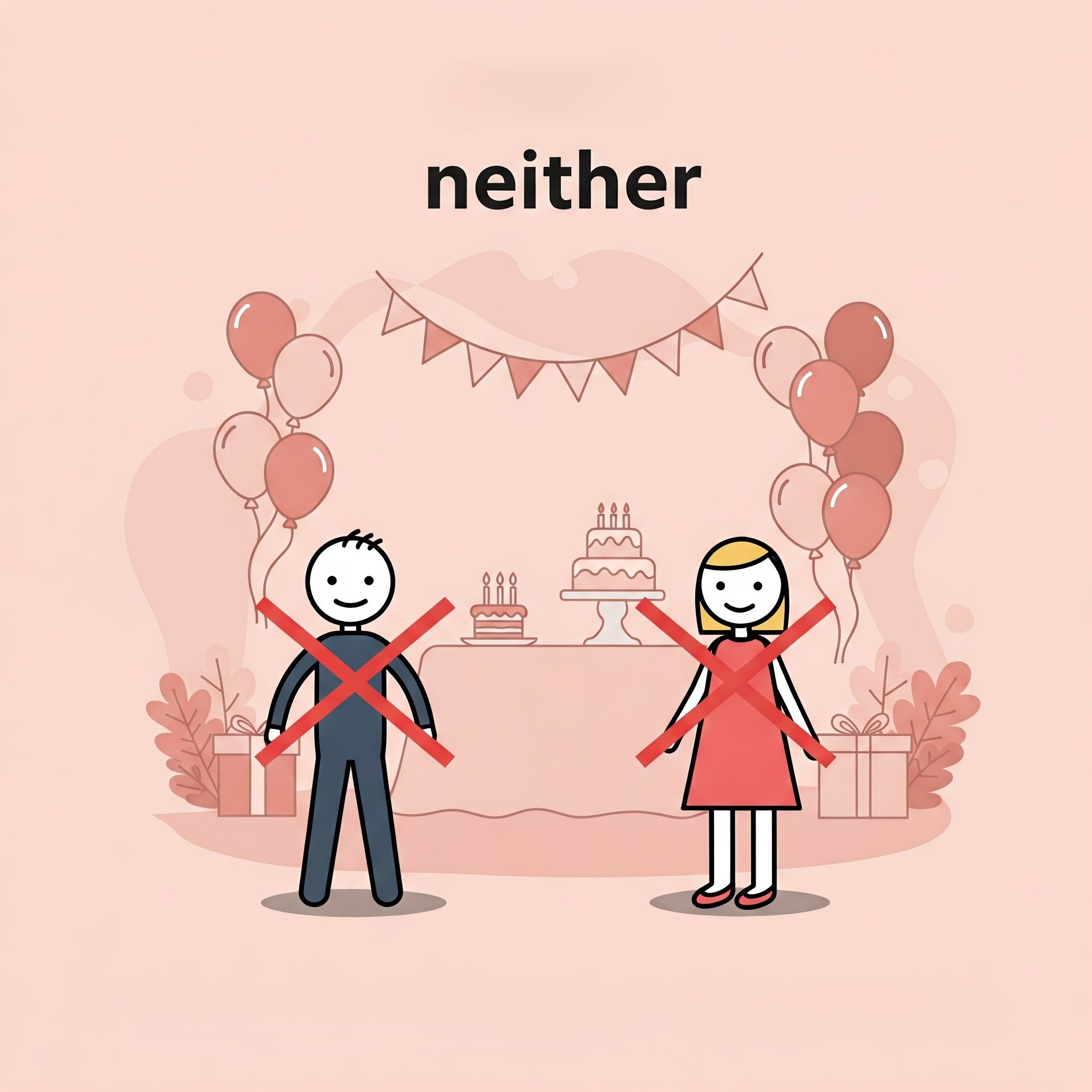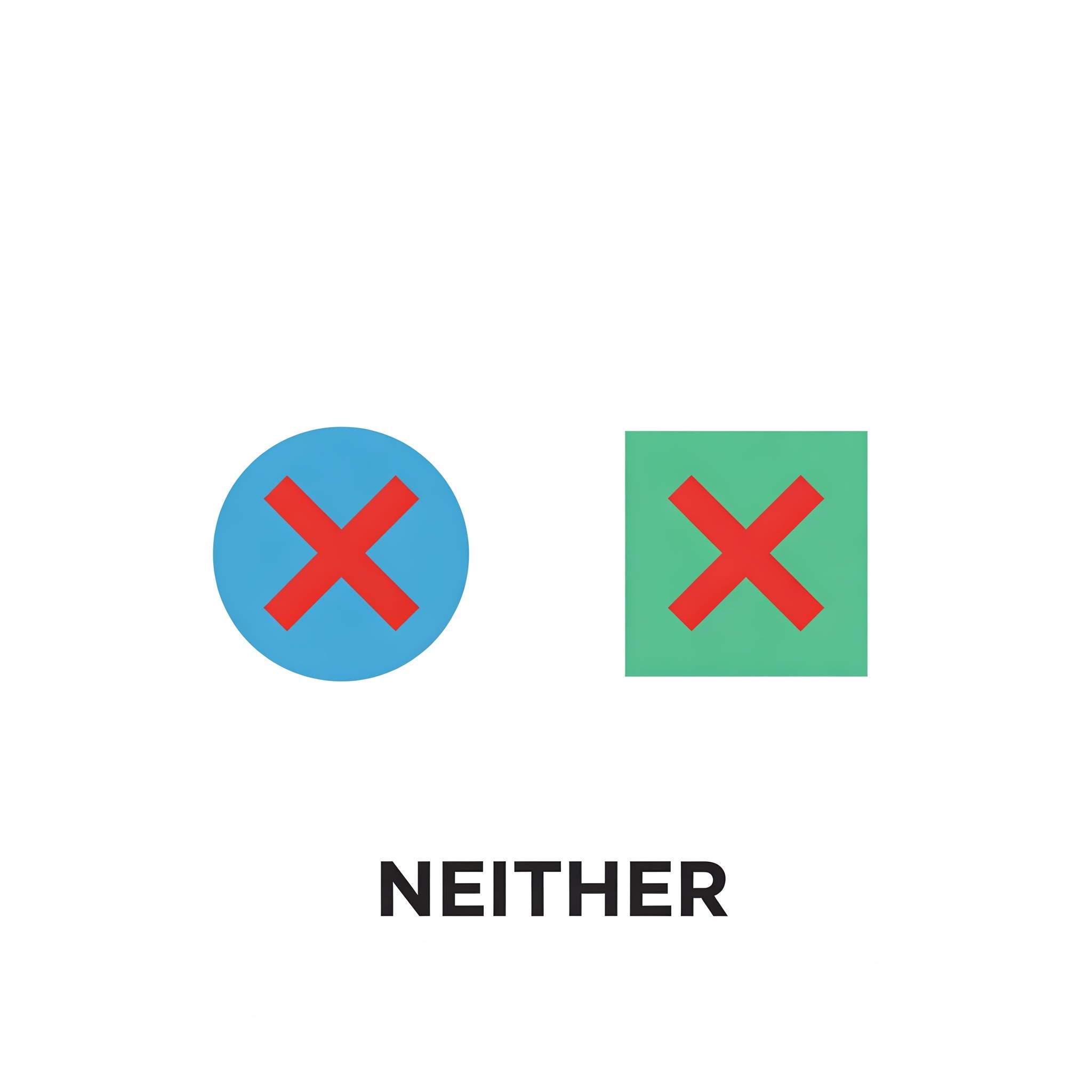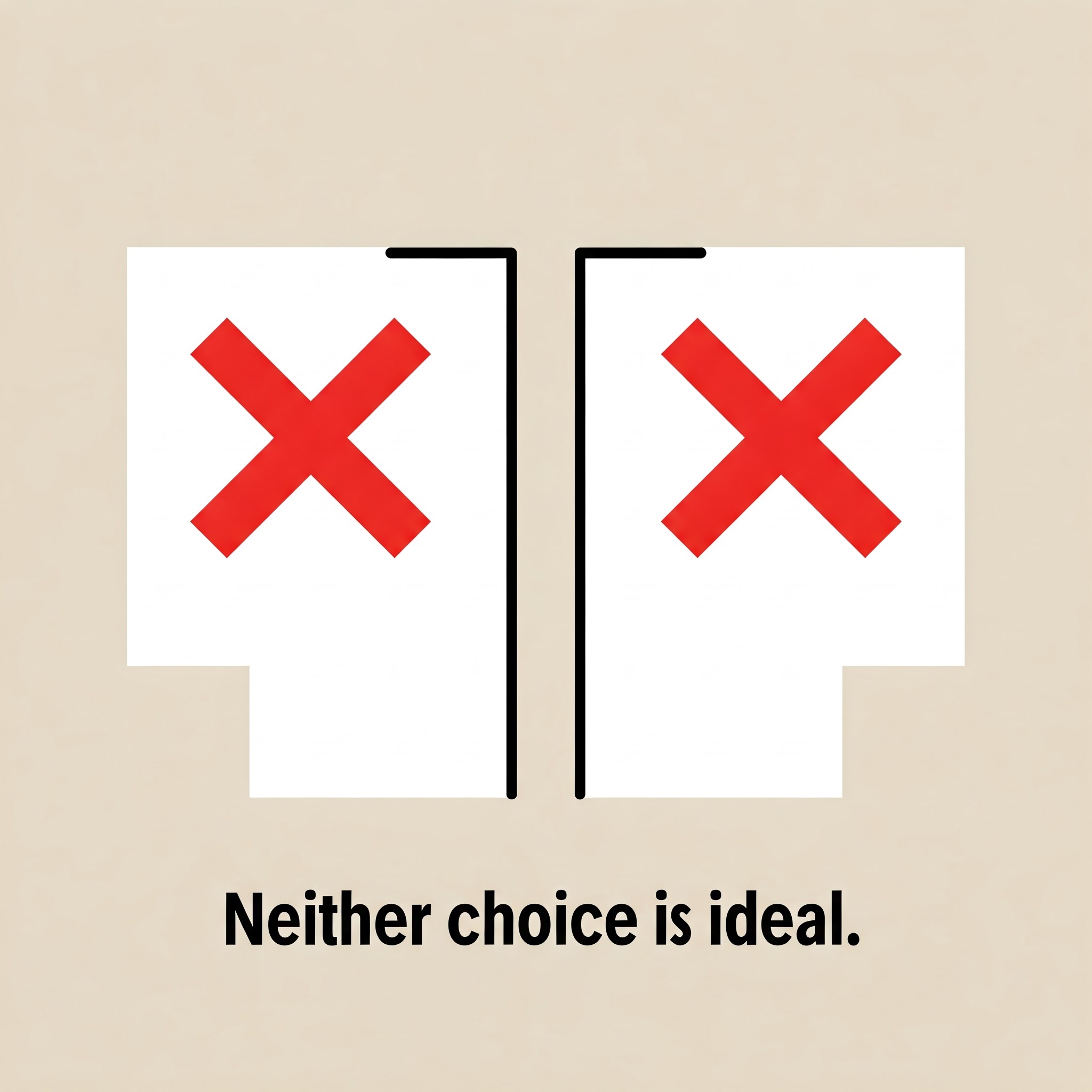Neither
Definition
Neither can function as a conjunction, pronoun, or determiner. It is used to indicate that none of two or more options is applicable or true.
Parts of Speech
- Conjunction
- Pronoun
- Determiner
Pronunciation
American English
- IPA Pronunciation: /ˈniːðər/, /ˈnaɪðər/
- Respelling: NEE-thur, NY-thur
British English
- IPA Pronunciation: /ˈniːðə/, /ˈnaɪðə/
- Respelling: NEE-thuh, NY-thuh
Etymology
The word "neither" originates from Old English "nāhwæther," meaning "not either," a combination of "nā" (not) and "hwæther" (whether). It is related to Old High German "niowedar" and Gothic "ni hwathar," carrying a similar meaning.
Derivatives
- Neither-nor (phrase)
- Neither here nor there (idiom)
- Neither side (phrase)
- Neither one (phrase)
- Neither party (phrase)
Synonyms
- None
- Not either
- Not one
Antonyms
- Both
- Either
- All
Usage
The term "neither" is often used in negative constructions or when presenting mutually exclusive options. For example: "Neither option is suitable," or "Neither of them attended the meeting."
Related Terms
- Either: Indicates one or the other of two options.
- Both: Refers to two things considered together.
- None: Refers to not any.
Detailed Definitions
Conjunction
- Used to introduce a negative statement that applies to two or more things: Links two clauses or phrases where neither is true.
- Example: "Neither John nor Sarah could attend the party."
Pronoun
- Not one nor the other of two people or things: Refers to none of the options presented.
- Example: "Neither of the answers was correct."
Determiner
- Not one nor the other of two things: Used before a noun to indicate that both options are excluded.
- Example: "Neither choice is ideal."
neither



🇨🇳 Chinese (Mandarin)
- 都不 (neither in the context of "neither this nor that")
- IPA: /toʊ̯ pu/
- Respelling: Dōu bù
- 也不 (neither in the context of "neither do I")
- IPA: /jɛ pu/
- Respelling: Yě bù
🇮🇳 Hindi
- ना (neither in the context of "neither this nor that")
- IPA: /naː/
- Respelling: Naa
- भी नहीं (neither in the context of "neither do I")
- IPA: /bʱiː nəhiːn/
- Respelling: Bhi nahiin
🇪🇸 Spanish
- Ni (neither in the context of "neither this nor that")
- IPA: /ni/
- Respelling: Ni
- Tampoco (neither in the context of "neither do I")
- IPA: /tamˈpoko/
- Respelling: Tampoco
🇫🇷 French
- Ni (neither in the context of "neither this nor that")
- IPA: /ni/
- Respelling: Ni
- Non plus (neither in the context of "neither do I")
- IPA: /nɔ̃ plys/
- Respelling: Non plus
🇸🇦 Arabic (Modern Standard)
- لا (neither in the context of "neither this nor that")
- IPA: /laː/
- Respelling: Laa
- ولا (neither in the context of "neither do I")
- IPA: /walaː/
- Respelling: Wala
🇧🇩 Bengali
- না (neither in the context of "neither this nor that")
- IPA: /naː/
- Respelling: Na
- ও না (neither in the context of "neither do I")
- IPA: /o naː/
- Respelling: O na
🇷🇺 Russian
- Ни (neither in the context of "neither this nor that")
- IPA: /ni/
- Respelling: Ni
- Тоже нет (neither in the context of "neither do I")
- IPA: /toʐɨ nʲet/
- Respelling: Tozhe nyet
🇵🇹 Portuguese
- Nem (neither in the context of "neither this nor that")
- IPA: /nẽj̃/
- Respelling: Nem
- Também não (neither in the context of "neither do I")
- IPA: /tɐ̃ˈbẽj̃ nɐ̃w̃/
- Respelling: Também não
🇮🇩 Indonesian
- Bukan (neither in the context of "neither this nor that")
- IPA: /buˈkan/
- Respelling: Bukan
- Juga tidak (neither in the context of "neither do I")
- IPA: /dʒuɡa tiˈdak/
- Respelling: Juga tidak
🇩🇪 German
- Weder (neither in the context of "neither this nor that")
- IPA: /ˈveːdɐ/
- Respelling: Weder
- Auch nicht (neither in the context of "neither do I")
- IPA: /aʊ̯x ˈnɪçt/
- Respelling: Auch nicht
🇯🇵 Japanese
- どちらも~ない (neither in the context of "neither this nor that")
- IPA: /do.tɕi.ra mo ˈna.i/
- Respelling: Dochira mo nai
- 私も (neither in the context of "neither do I")
- IPA: /watashi mo/
- Respelling: Watashi mo
🇻🇳 Vietnamese
- Cũng không (neither in the context of "neither this nor that")
- IPA: /kʊŋ ˧ˀ˨əw̯k˧ˀ˨/
- Respelling: Cũng không
- Tôi cũng không (neither in the context of "neither do I")
- IPA: /tʰoj kʊŋ ˧ˀ˨əw̯k˧ˀ˨/
- Respelling: Tôi cũng không
🇰🇷 Korean
- 둘 다 아니다 (neither in the context of "neither this nor that")
- IPA: /dul da aɪniːda/
- Respelling: Dul da ainida
- 나도 아니다 (neither in the context of "neither do I")
- IPA: /naːdo aɪniːda/
- Respelling: Nado ainida
🇹🇷 Turkish
- Ne... ne (neither in the context of "neither this nor that")
- IPA: /ne ... ne/
- Respelling: Ne... ne
- Ben de değil (neither in the context of "neither do I")
- IPA: /ben de deːil/
- Respelling: Ben de değil
🇵🇰 Urdu
- نہ (neither in the context of "neither this nor that")
- IPA: /nəː/
- Respelling: Na
- میں بھی نہیں (neither in the context of "neither do I")
- IPA: /meː bʱiː nəːiːn/
- Respelling: Main bhi nahiin





